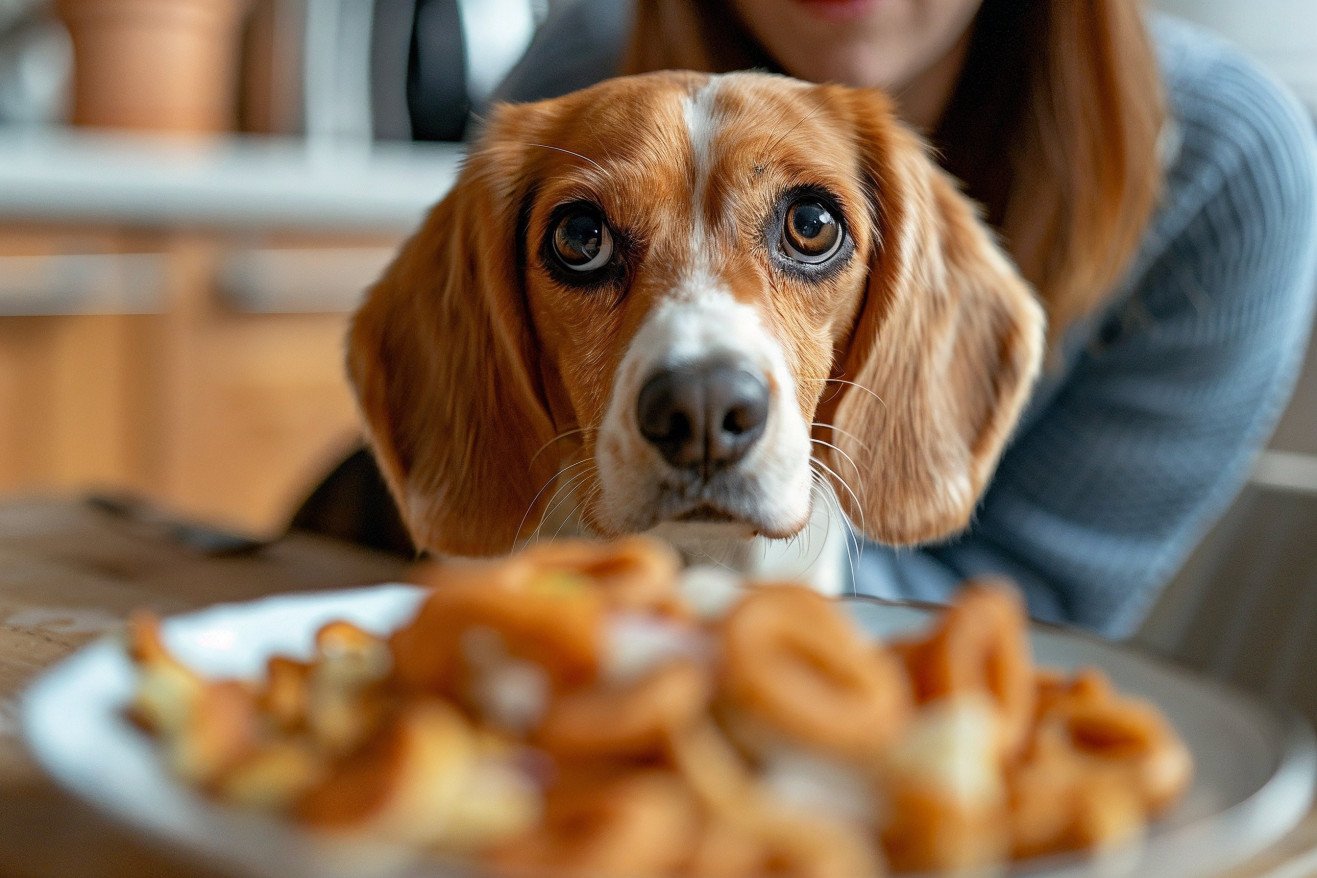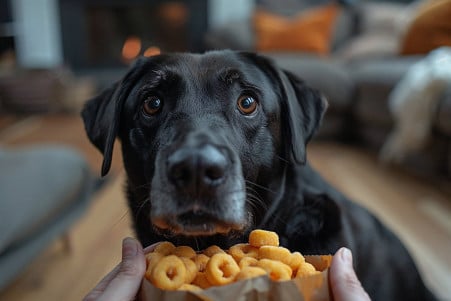Can Dogs Eat Onion Rings? Unpacking the Toxic Risks
11 March 2024 • Updated 9 March 2024

If you want to give your dog a bite of your fast food, you may be wondering if it’s OK to share your onion rings. Unfortunately, dogs can’t eat onion rings because onions are toxic to dogs and can cause oxidative damage to red blood cells, which can result in anemia. Even small amounts can be dangerous, so it’s best to avoid giving your dog any foods that contain onions.
This article will use evidence-based veterinary science and animal nutrition research to explain the risks of onions and other similar foods to dogs. It will also look at research on canine metabolism and toxicology to show why some human foods are toxic to dogs. This information will help you understand the science behind the risks so you can make the best choices for your dog’s health and diet.
Can dogs eat onion rings?
How Onion Toxicity Affects Dogs
The compound N-propyl disulfide, which is found in onions, is especially dangerous to dogs. According to the Merck Veterinary Manual, this compound attacks the red blood cells in dogs, causing oxidative damage that results in hemolytic anemia. This potentially fatal condition occurs when red blood cells are destroyed, which prevents oxygen from being properly distributed throughout the body.
Onion toxicity isn’t specific to any one type of onion, and all forms of onions, including cooked, raw, dehydrated, and powdered, can be toxic to dogs.
According to a study in the PMC, clinical signs of onion toxicity include gastrointestinal upset like vomiting and diarrhea, as well as more serious symptoms such as tachycardia (rapid heart rate), weakness, lethargy, and dark urine.
Icterus, or jaundice, can also occur due to the destruction of red blood cells. All of these symptoms indicate that the dog requires immediate veterinary care.
Canine Nutrition and Metabolism
Although dogs have evolved to eat a wide range of foods, their metabolism is quite different from that of humans. Dogs, as members of Carnivora, can eat a range of plant and animal products, but their nutritional requirements are not the same.
According to VCA Animal Hospitals, the digestibility and quality of proteins and fats are important, regardless of their origin. Despite popular belief, dogs have the necessary enzymes to digest carbohydrates, including sugars and starches, especially if they are cooked.
The nutritional composition of a dog’s diet is important. According to VCA Animal Hospitals, the Association of American Feed Control Officials (AAFCO) guidelines state that a complete dog diet includes proteins, fats, carbohydrates, minerals, and vitamins, and these should be adjusted based on the dog’s life stage. This is important because, as the Journal of Animal Science and Biotechnology notes, amino acid metabolism in dogs is affected by factors such as breed and age.
One of the biggest issues with the dog’s metabolism is the consumption of high-fat and high-carbohydrate foods, such as onion rings. As the Journal of Animal Science and Biotechnology explains, dogs metabolize fats and carbohydrates differently from humans, and even within breeds, there are differences in nutrient metabolism.
This means that feeding dogs high-fat human foods can lead to imbalances and health problems, which shows the importance of feeding dogs a diet that’s specifically formulated for their nutritional needs.
Finally, there are metabolic differences between small and large dogs that affect the safety of their diet. As PMC explains, research has shown that small dogs may have different metabolic rates and needs than larger dogs, which is due to their lower antioxidant status and different amino acid profiles.
This shows that it’s important to feed dogs a diet that’s tailored to their individual needs based on their life stage and size and avoid human foods that don’t meet their nutritional requirements.
Short-Term and Long-Term Risks of Onion Poisoning in Dogs
The Journal of Veterinary and Animal Toxicology notes that short-term risks of onion poisoning in dogs include gastrointestinal upset, which can cause vomiting, diarrhea, and abdominal pain. More seriously, onion ingestion causes hemolytic anemia, which is the breakdown of red blood cells and leads to a lack of oxygen in a dog’s body.
Onion toxicity can also lead to more serious long-term health risks. As outlined by the Journal of Nutrition, chronic or repeated exposure can result in organ failure and damage because the body is constantly breaking down red blood cells and trying to compensate for anemia.
Veterinarians diagnose onion poisoning based on a dog’s history, clinical signs, and laboratory findings, including the presence of Heinz bodies in the blood, which are a sign of oxidative damage to red blood cells. As reported by SciELO, treatment plans generally include gastrointestinal decontamination, supportive care with IV fluids, and blood transfusions in more severe instances.
Knowing the severity of these health risks can help dog owners make sure they don’t feed their pets human foods that can be toxic. Instead, it’s important for dog owners to make sure they’re feeding their pets a balanced diet that meets their specific dietary needs to ensure their dog’s overall health and happiness.
How Fried Foods Impact Canine Health
Fried foods, especially onion rings, are not good for dogs because they are high in fat and offer no nutritional value. According to PetMD, foods that are high in fat can cause pancreatitis in dogs, which is an inflammatory condition of the pancreas that can cause pain and even be life-threatening. Onion rings are not nutritious for dogs and can be harmful because of their fat content.
In order to meet the nutritional needs of dogs, pet parents should opt for healthier treats instead of fried and fatty ones. According to Stephanie Rogers, some healthy options include carrots, apples, and cooked salmon, which all contain important vitamins and minerals and don’t come with the risks associated with high-fat foods.
Not only are these treats good for a dog’s health, but they also help ensure that dogs are getting a well-rounded diet that meets the Association of American Feed Control Officials (AAFCO) guidelines for pet foods.
Pet parents can make sure that their dogs are getting a variety of treats that are good for them by making sure that these healthy options are part of their regular treat rotation. By making sure that they are choosing healthy and appropriate options, pet parents can make sure that their dogs are safe and healthy when it comes to their diet.
Protecting Your Dog from Harmful Foods
It is up to pet parents to be watchful and take measures to protect their dogs from accidentally ingesting toxic foods like onion rings. According to the American Kennel Club, all parts of the onion plant are toxic to dogs, and even a small amount can result in dangerous levels of toxicity.
Therefore, the first step is to make sure that onion rings and similar foods are kept in a place that is not accessible to your dog. This may mean using child-proof locks on cabinets and never leaving harmful foods unattended on countertops or tables where dogs can easily reach them.
It is also important to make sure that everyone in the household is informed about the dangers of onions, garlic, chives, and leeks—which are all part of the Allium species. According to VCA Animal Hospitals, these foods can cause gastrointestinal upset and even life-threatening anemia in dogs. Make sure that everyone in the household knows about these risks and is committed to keeping these foods away from pets.
If your dog does get into onion rings or another toxic substance, it is important to act quickly. According to the Pet Poison Helpline, this often involves decontaminating your dog immediately, which may include inducing vomiting and giving activated charcoal to help reduce the absorption of the toxin, and then seeking veterinary care.
By making sure you are prepared and informed, you can make sure that you are ready to act quickly to minimize your dog’s exposure and keep them safe.
Final Thoughts: Why It’s Important to Make Healthy Food Choices for Dogs
As we conclude our look into dog dietary health, it’s important to reiterate that onion rings are definitely not something you should share with your dog. The toxic compounds in onions can lead to oxidative damage in red blood cells, which can result in severe health issues like hemolytic anemia.
We’ve also emphasized the importance of understanding the differences between human and dog dietary needs and metabolism. Dogs require a balanced diet that’s formulated to meet their specific nutritional requirements, not the empty calories and low nutritional value of onion rings, which are not only nutritionally void but can also be dangerous.
Understanding and knowledge are the keys to being a responsible pet owner. By learning about the risks of certain human foods and following food safety protocols, you can help keep your dog safe and healthy. Also, remember that the decisions you make about what to feed your pet can have long-term effects on their health.
So, always make sure to prioritize your dog’s health by choosing their food carefully and making sure it’s nutritious, and make sure to always be vigilant about keeping harmful foods away from them. By doing these things, we can help ensure that our dogs live long, healthy lives.


